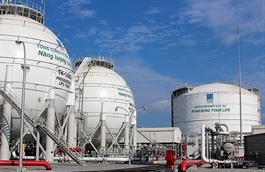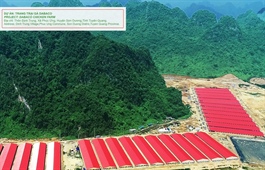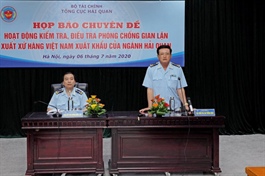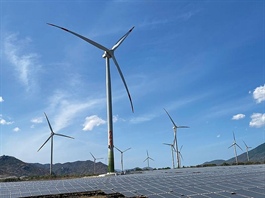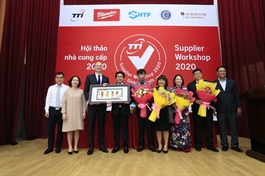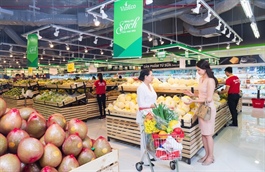Eased regulations set up EVFTA agriculture benefits
Eased regulations set up EVFTA agriculture benefits
Though Vietnam’s agricultural sector will receive attention from the forthcoming EU-Vietnam Free Trade Agreement, it needs to overcome some challenges to enjoy optimum preferential treatment.
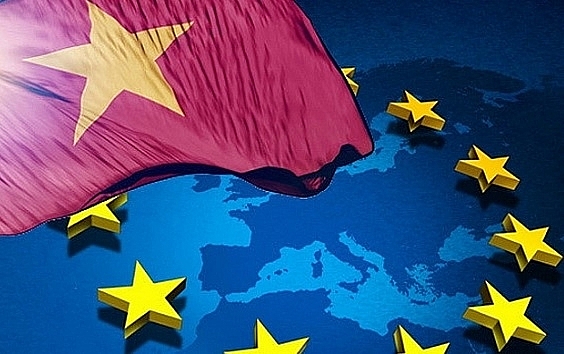
Eased regulations set up EVFTA agriculture benefits, Illustrative image (Photo: internet)
|
Pham Thai Binh, general director of Trung An Hi-Tech Farming JSC, told VIR that Vietnamese rice products exported to the European Union are currently subject to tariff rates of between 5 and 45 per cent. European importers are responsible for tariff payments so they often increase Vietnamese rice prices to make profit.
In the time to come, Vietnamese rice products will see mostly duty-free tariff quotas as soon as the EU-Vietnam Free Trade Agreement (EVFTA) is implemented. This will help increase the competitiveness of Vietnam’s rice exports to the EU market as importers can now lower the price for European consumers.
Binh said that Trung An is currently exporting less than 10,000 tonnes of fragrant rice to France, Poland, Russia, and Denmark. The company is expected to increase its export volume to 12,000 tonnes of fragrant rice to the EU once the agreement comes into force, expected to be in August.
The company has made investments in the cultivation process to produce pesticide-residue-free rice for the EU market. Most recently, the company has successfully placed its Trung An rice brand name on packaging to promote Vietnamese rice to EU consumers.
Meanwhile, Do Thi Thanh Thuy, representative of Nam Viet Corporation, said that the company is exporting pangasius, or basa fish, to the EU, Middle East, South America, and Asia. Each month, the company exported $7 million worth of products to Europe. With upcoming official enforcement of the EVFTA, the company expects to boost its export volume to the EU by 30 per cent.
Nicolas Audier, chairman of the European Chamber of Commerce in Vietnam (EuroCham), told VIR that agricultural goods represent some of Vietnam’s biggest exports to the EU market where cashew nuts, coffee, fruit, vegetables, and seafood are sold in large quantities. So, once the EVFTA is implemented and tariffs begin to fall, there will be huge opportunities for Vietnamese exporters to grow their market share. For instance, three years after the EVFTA’s entry into force, tariffs on processed agro products will fall from 37 to 6 per cent, and for fisheries from 60 to 15 per cent. After seven years, both will fall even further to just 2 per cent each.
On the same note, a representative of Nafoods Group said that the EVFTA will be a major boost to Vietnam’s exports, helping to diversify markets and export commodities, especially agricultural and aquatic products, where Vietnam has many competitive advantages. Accordingly, all exported products will benefit from tax incentives and trade facilitation, including Vietnam’s key agricultural products like rice, coffee, honey, livestock, fruit, and seafood.
Nafoods is currently exporting juice and individual quick-freezing (IQF) products which are produced and processed from fruit materials such as passion fruit, mango, dragon fruit, and banana. It means the company will enjoy the preferential treatment once the EVFTA takes effect.
In 2019, the export revenue to the EU market accounted for 45 per cent of Nafoods’ total export revenue structure. In the first six months of 2020, its export volume has increased by 50 per cent on-year. After a period of research and evaluation, Nafoods has carried out investment to raise production capacity of existing factories. The increase aims to meet the demand of international markets including the EU with more than 30,000 tonnes of finished products a year. In 2022, Nafoods will complete the development of a fresh fruit packaging factory and cold storage as well as the installation and operation of a drying production line. The company is expected to increase its revenue from value-added products by 150 per cent and dried products by 100 per cent. By optimising production lines, its IQF and juice products will increase by 30-50 per cent of the production capacity against 2020.
However barriers will still be in place that Vietnam is required to overcome if it is to unlock the full potential of the EVFTA. Thuy from Nam Viet said that some barriers are strict and unnecessary. “We proposed that the government should work closer with the EU to lower the technical barriers and ease administrative processes to help Vietnamese exporters,” Thuy added.
Still, Eurocham chairman Audier argued that products exported to the European market will need to meet the EU’s stringent safety requirements, including sanitary and phytosanitary measures. Food safety is critical, and consumers must have confidence that the produce sold and consumed meets these high standards.
Therefore, it is essential that domestic producers are aware of these standards, and this will require information-sharing and capacity-building from both the Vietnamese authorities and foreign business communities.
A second, related challenge is the international image of Vietnamese produce. While Vietnamese cuisine is popular around the world, the perceptions of Vietnamese agricultural produce – in particular concerning issues such as the use of pesticides – could be improved, according to those in the industry. If Vietnam can meet these high food safety standards, it will help to grow the positive reputation of Vietnamese produce.
“One further issue is the EU’s yellow card warning for illegal, unregulated, and unreported fishing. However, we know that both the government and the fishing sector are working hard to address concerns around the traceability of fish, and I hope that this will be resolved soon,” Audier explained. “Indeed, I am confident that Vietnam is more than capable of overcoming these challenges and realising the full benefits of the EVFTA for its agricultural sector.”








